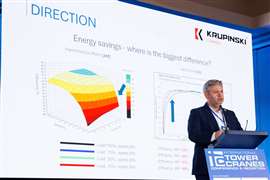Collins continues Link-Belt legacy
02 February 2021
Link-Belt’s people and products keep Pat Collins challenged and engaged. D.Ann Shiffler reports.
Pat Collins is one of the most trusted guys in the crane industry. Genuine and forthright, he always has a smile and an encouraging word. He stands behind the company he works for and the products they produce. Family, friend, colleague or customer, he’s got your back.
Collins’ entry into the construction equipment business started in Cedar Rapids, IA. Family friend Fred Krumm, who was a mentor and role model, introduced Collins to the industry.
“Patrick you need to learn hydraulics, it’s the future,” Krumm told him.
Collins went to work for Krumm in the service department at Rexco Equipment, which was owned and operated by Rex Smith, Sr., a former vice president of sales for Link-Belt Speeder.
“So you could say I was first introduced or exposed to the ‘old school ways’ in the business from the get-go, and I have always appreciated that,” Collins said.
Something bigger
Because Rexco and FMC Link-Belt were both located in Cedar Rapids, IA, Collins would visit the factory quite often, interacting with personnel and getting to know the Link-Belt team.
“It was a matter of time before the lure of something bigger got me,” Collins said.
He was hired on at Link-Belt in 1979 as a service training instructor. He moved to the large crane department and went on to become a district service rep in the Rocky Mountain territory. In 1989 he took a job in the marketing department in Lexington, KY, where Link-Belt had consolidated its operations and manufacturing facility. He is still in Lexington today, serving as director of product marketing for the legacy company that produces a leading range of crane classes.
Did Collins envision making the crane business his life’s work?
“I guess growing up in rural Iowa, I enjoyed running and being around all types of equipment and mechanical work, so once I connected with Link-Belt, I would say yes, I knew I would stay in the crane world,” he mused. “I have enjoyed the variety of assignments; I’ve always felt challenged and that I was moving forward. I guess you could say no other path looked ‘greener.”
In the 15-plus years I have edited American Cranes & Transport, Pat Collins has been a reliable and valued resource. He’s a relationship guy who is genuinely interested in the people in the industry. And after four decades in the crane business, he is just as excited about the cranes rolling off the production line in Lexington as he was the first day he started at Link-Belt.
And one more thing, hands down, Collins is a plant tour specialist. When introducing new products or showing off the Link-Belt manufacturing facility, he takes you through the evolution of producing a crane in a manner that is interesting, educational and fun.
You have been in the crane sector for a long time, witnessing a lot of ups and downs. How do you characterize the state of the crane business?
I would describe it as being in a transition phase, coming out of the braking or bottoming out stage to the mode of cautiously moving to an improving market and bringing production back – some what of a modest first phase, if you will.
What have been the biggest challenges for Link-Belt during the Covid-19 debacle?
Link-Belt is considered an essential manufacturer, so we have not closed. We are doing everything we can to protect our team while continuing to provide our customers with the support they expect.
We follow personal hygiene precautions as recommended by the CDC. We have shifted our production and office schedules, restricted visitors and canceled all non-essential travel. We have eliminated large meetings and managed smaller meetings with proper social distancing. In the factory, we have extended break times for handwashing, increased the amount of hand sanitizer stations around the plant and added to our cleaning staff. We have discontinued buffet-style food service in our cafeteria to only include to-go food purchase. Like everyone else, we continue to monitor the ever-changing circumstances and to make adjustments.
What have been the biggest challenges for your dealers and end-users?
There is no ‘one scenario fits all’ in describing what our distributors have faced. To some degree the answer is state-by-state or region. For others it depends on the company size. I think instinctively, early on, perhaps there was a kind of a survival mode mentality, given all the unknowns. However, as time went on, it became more of an adapt and cope strategy. Many are still operating under severely restricted conditions. I think limited direct customer contact makes for a tough process, but everyone has the same threats and concerns, so you do whatever you have to.
I could not speak to an end-user’s biggest issues. I have been part of conference calls hearing just a portion of end-user problems such as workers at the same jobsites with mixed trades and common facilities creating exposure issues. Transport companies with drivers becoming ill on the road with multiple logistic challenges, their input on this could be a story in itself, I would imagine.
How do you envision the rollout of the recovery, once the Covid-19 crisis is under control?
Coming out of such an epic event, I could see an initial bump-up or possible surge as past-due, as ongoing projects try to finish quickly as new job start dates approach. But after that, we may see a more gradual, steady rise, as whatever skepticism of a recovery gives way to data that proves that the pandemic is over and gone.
What is Link-Belt’s strategy for product development during a down market?
Really, no change other than watching inventory on planned replacement units. This may be a bit more critical; we are quick to adjust so if we see the market slow down, we may adjust down the purchases downstream on build-out inventory. This will allow us to cut in new models sooner, avoiding the delay of new rollouts.
Which crane classes are the most active?
Our telescopic crawler line has really never seen a slowdown and this market continues to grow. So, for us, this market has continued to be strong. After that I would say all markets have taken some kind of hit.
Any new developments on the horizon?
Come see us in Lexington, we might give you a peek.
What product line brings you the most satisfaction? Do you have a favorite crane class?
This is a tough one. As long as I have been here, it seems like all of them have some kind of story or particular memory.
To be honest, I am amazed at the staying power of the lattice mechanical-style cranes (crawler and truck cranes). When you drive down an interstate and look up at a new overpass being constructed, there is a good chance you will see an older mechanical crane still performing and delivering a good day’s work. Some of these units, design-wise, could date back into the mid to late 1960s. When you think of the people who designed these machines, you have to wonder, did they have any idea at the time that these machines would still be delivering work all these years later?
The day is coming, technology and standards will make them obsolete. It’s something to celebrate when no other equipment of that vintage is still on the job. Not even close. These machines, of all different makes and colors, should be long since worn out, but not these, if they are cared for and maintained properly.
As a consummate people person and a long-timer in this industry, what keeps you engaged?
I guess it’s just the right combination of people, challenges and opportunities that I am involved with that keeps my attention.
As long as there is something in front of me to achieve or complete it stays interesting. It’s the relationships you have with others that keeps it all together.
It is obvivous that you like what you do.
I enjoy construction equipment of all types, so there is that, but I think it has to do with the two somewhat separate worlds I get to interact with. First the internal side, I enjoy the people I work with and what we accomplish together here at the factory and our team in the field.
Then there is the outside or external world if you will. It is satisfying to help dealers and end-user personnel with issues or when they are needing answers. They are often in a pinch timewise for help, so getting them taken care of as quickly as you can is important. You may not hear back from them, but these days talking to someone and getting an answer back can be a big deal.
I really enjoy relationships with customers and our involvement with the different trade associations. I think staying current and knowledgeable on industry policy and issues is a must, and also allows me to see things in a more complete light from design concept to doing the work in the field.
Are there any downsides?
I think the smaller number of mom and pop or family businesses that the crane industry used to have made our industry a little more special. They were a little more of the personal part of your customer base. Today, [the larger companies] are much more structured and formal with decision-making in a very calculated, long-range view. But lots of other things have evolved as well. Things change for a reason.
What are you most looking forward to after the Covid-19 crisis has passed?
Same things as everybody else, but mostly the arrival of our first grandchild in May!
What have you been up to during the pandemic?
Why do I get that question when there is a pandemic going on? (Laughing.) Actually, Megan, our oldest daughter, has been in Germany for the last 10 years. Pandemic pressure accelerated her return home plans, so we got her back in Lexington this spring and helped her get settled. That was a big move.
Beyond that, we did some exploring of Kentucky this summer, traveling on weekends to smaller state historic sites and some parks during off-peak times as well as some regular bicycle trail visits.
STAY CONNECTED


Receive the information you need when you need it through our world-leading magazines, newsletters and daily briefings.
CONNECT WITH THE TEAM













